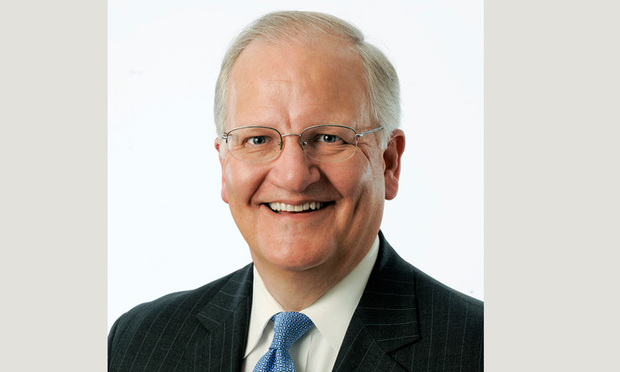#MeToo Having Impact That May Not Show in Surveys, Atlanta Utility GC Says
Southern Co.'s James Kerr discussed the topic in relation to the latest general counsel survey from Consero Group, which presents executive conferences.
January 15, 2019 at 05:12 PM
4 minute read
 James Kerr, general counsel of Southern Co. Courtesy photo.
James Kerr, general counsel of Southern Co. Courtesy photo.
The most significant impact the #MeToo movement has had on Atlanta-based Southern Co. has been to inspire a broad dialogue throughout the gas and electric utility about workplace values, according to general counsel James Kerr.
“We are governed by the company's strong values statement,” said Kerr, who is also the company's chief compliance officer. “So we are not changing policies, but are changing the conversation. It has prompted an openness among leaderships and others … to fundamentally raise awareness around the importance of general issues of equality, diversity and inclusion, and around manifestations such as pay equity, harassment and the #MeToo movement.”
Kerr discussed the topic in relation to the latest general counsel survey from Consero Group, which presents executive conferences. Consero created the 2019 General Counsel Report from last year's general counsel forums with 73 chief legal officers from corporations with revenues at or above $500 million.
Kerr said he was a little surprised when 57 percent of his colleagues in the survey responded that the #MeToo movement has not impacted their workplace. Also somewhat surprising was that 54 percent said diversity is not a factor when considering hiring outside counsel. And 72 percent said they do not measure diversity as a function of their internal legal operations.
“The results were a little inconsistent with what I would have expected, but perhaps the answers were due to a narrow wording of the questions,” he suggested.
In other words, Kerr said such cultural issues might not have had concrete impact, such as being specifically addressed in a new workplace policy. “But I do believe these issues and similar issues are receiving much greater attention than one might be led to believe by the responses,” he explained.
He added, “Cultural issues like equality and fair treatment, and diversity and inclusion are increasingly relevant, especially given [environmental, social and governance] investor interest. Certainly at our company they are.”
A top priority for GCs in the survey, Kerr noted, involved privacy and cybersecurity. Nearly 40 percent of respondents cited that area as their biggest crisis management concern.
Nearly half indicated that their organizations had experienced a cybersecurity incident in the last 12 months.
Asked in the survey about the biggest data privacy challenge, the largest group—30 percent—cited not hackers, but regulatory changes relating to data privacy. Product liability issues were second, at 25 percent, while only 10 percent cited cyberattacks.
Some 77 percent of respondents said their companies were moderately to well prepared to deal with a cyberattack.
On another topic, some 60 percent of respondents said they have formalized legal operations functions.
The survey also showed a high percentage of survey participants, 75 percent, indicated that they do not have a formalized metrics reporting program that measures legal department value. Another 65 percent also stated that they don't leverage billing metrics for savings and improved relationships with outside counsel.
The report took a dim view of those responses. “In a corporate atmosphere where executives must demonstrate their business department's value while ensuring that they also function efficiently and effectively, general counsel would do well to focus on metrics and reporting in 2019,” it advised.
Kerr agreed with that recommendation. “I believe my organization needs to do better there, and it does not surprise me that other similar organizations also need to,” he said.
Kerr added, “I would be very careful about allowing metrics to become too significant, but there is an important place for them. In large organizations with large budgets, at scale metrics are extremely important to make sure you are managing the cost, execution and quality of the organization.”
This content has been archived. It is available through our partners, LexisNexis® and Bloomberg Law.
To view this content, please continue to their sites.
Not a Lexis Subscriber?
Subscribe Now
Not a Bloomberg Law Subscriber?
Subscribe Now
NOT FOR REPRINT
© 2025 ALM Global, LLC, All Rights Reserved. Request academic re-use from www.copyright.com. All other uses, submit a request to [email protected]. For more information visit Asset & Logo Licensing.
You Might Like
View All
Ex-Marathon General Counsel Takes Legal Reins of Another Energy Company

GC With Deep GM Experience Takes Legal Reins of Power Management Giant
2 minute read
Jenner & Block Energy Practice Leader Joins Renewable-Power Giant Constellation as GC

Nation's Largest Utility Parts Ways With CLO Who Helped It Navigate Bribery Scandal
Trending Stories
- 1Some Thoughts on What It Takes to Connect With Millennial Jurors
- 2Artificial Wisdom or Automated Folly? Practical Considerations for Arbitration Practitioners to Address the AI Conundrum
- 3The New Global M&A Kings All Have Something in Common
- 4Big Law Aims to Make DEI Less Divisive in Trump's Second Term
- 5Public Notices/Calendars
Who Got The Work
J. Brugh Lower of Gibbons has entered an appearance for industrial equipment supplier Devco Corporation in a pending trademark infringement lawsuit. The suit, accusing the defendant of selling knock-off Graco products, was filed Dec. 18 in New Jersey District Court by Rivkin Radler on behalf of Graco Inc. and Graco Minnesota. The case, assigned to U.S. District Judge Zahid N. Quraishi, is 3:24-cv-11294, Graco Inc. et al v. Devco Corporation.
Who Got The Work
Rebecca Maller-Stein and Kent A. Yalowitz of Arnold & Porter Kaye Scholer have entered their appearances for Hanaco Venture Capital and its executives, Lior Prosor and David Frankel, in a pending securities lawsuit. The action, filed on Dec. 24 in New York Southern District Court by Zell, Aron & Co. on behalf of Goldeneye Advisors, accuses the defendants of negligently and fraudulently managing the plaintiff's $1 million investment. The case, assigned to U.S. District Judge Vernon S. Broderick, is 1:24-cv-09918, Goldeneye Advisors, LLC v. Hanaco Venture Capital, Ltd. et al.
Who Got The Work
Attorneys from A&O Shearman has stepped in as defense counsel for Toronto-Dominion Bank and other defendants in a pending securities class action. The suit, filed Dec. 11 in New York Southern District Court by Bleichmar Fonti & Auld, accuses the defendants of concealing the bank's 'pervasive' deficiencies in regards to its compliance with the Bank Secrecy Act and the quality of its anti-money laundering controls. The case, assigned to U.S. District Judge Arun Subramanian, is 1:24-cv-09445, Gonzalez v. The Toronto-Dominion Bank et al.
Who Got The Work
Crown Castle International, a Pennsylvania company providing shared communications infrastructure, has turned to Luke D. Wolf of Gordon Rees Scully Mansukhani to fend off a pending breach-of-contract lawsuit. The court action, filed Nov. 25 in Michigan Eastern District Court by Hooper Hathaway PC on behalf of The Town Residences LLC, accuses Crown Castle of failing to transfer approximately $30,000 in utility payments from T-Mobile in breach of a roof-top lease and assignment agreement. The case, assigned to U.S. District Judge Susan K. Declercq, is 2:24-cv-13131, The Town Residences LLC v. T-Mobile US, Inc. et al.
Who Got The Work
Wilfred P. Coronato and Daniel M. Schwartz of McCarter & English have stepped in as defense counsel to Electrolux Home Products Inc. in a pending product liability lawsuit. The court action, filed Nov. 26 in New York Eastern District Court by Poulos Lopiccolo PC and Nagel Rice LLP on behalf of David Stern, alleges that the defendant's refrigerators’ drawers and shelving repeatedly break and fall apart within months after purchase. The case, assigned to U.S. District Judge Joan M. Azrack, is 2:24-cv-08204, Stern v. Electrolux Home Products, Inc.
Featured Firms
Law Offices of Gary Martin Hays & Associates, P.C.
(470) 294-1674
Law Offices of Mark E. Salomone
(857) 444-6468
Smith & Hassler
(713) 739-1250






